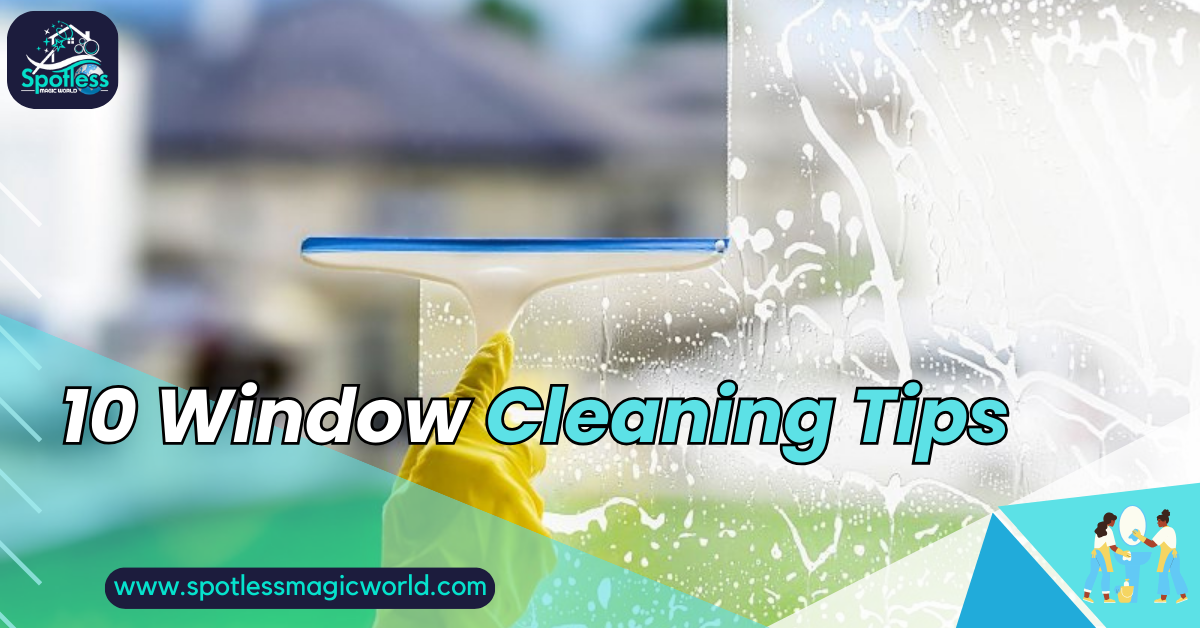Licensed And Insured

10 Window Cleaning Tips: Tricks for Spotless and Streak-Free Results
Window cleaning not only enhances the looks of your home but also allows more natural light to enter and peep through your living space. However, achieving a professional-level window cleaning job requires more than just spraying on with some glass cleaner and rubbing it away with a window-suitable paper towel.
To get your windows looking their best, you need to know the proper way to clean them without leaving behind any unsightly streaks or scratches.
In this article, we’ll provide you with expert window-cleaning tips and tricks to help you achieve that covetable transparent finish. From choosing the right tools and cleaning solutions to mastering the perfect technique, we’ll cover everything you need to know about window cleaning.
Whether you’re a homeowner or a professional cleaner, read on to discover the secrets of achieving flawless windows every time. So, let’s dive in and get those windows sparkling clean!
Why Is It Important To Clean Your Windows?
Window cleaning has become an indispensable part of home maintenance that should never be ignored, and there are several reasons why it is important to keep them clean.
Firstly, windows accumulate dust, dirt, and grime over time, which can obscure the glass surfaces and impede natural light from entering your home. A build-up of dirt and debris on the exterior window can also restrict the view from inside your home.
Secondly, allowing dirt and grime to accumulate on your windows for extended periods can cause permanent damage to the glass surfaces. Environmental factors like acid rain and hard water deposits can etch into the glass and cause irreversible damage or discoloration.
Lastly, regular cleaning of your windows can improve your home’s overall appearance and aesthetic appeal. Clean windows make your home look well-maintained and can increase its curb appeal if you’re planning to sell your property.
What Are The Benefits Of Having Clean Windows?
Keeping your windows clean has numerous benefits, both tangible and intangible. Firstly, clean windows allow more natural light to enter your home, making it brighter and more welcoming. Natural light also has several health benefits, including boosting vitamin D levels and improving mood.
Don’t be confused by the fact that a cleaned window produces vitamin D but it allows the sources producing vitamin D to penetrate through your transparent window.
Secondly, clean windows offer unobstructed views of your surroundings, allowing you to appreciate and enjoy the scenery outside. When windows are dirty, it can be difficult to see through them, and it can even make you feel closed off from the outside world.
Lastly, regularly cleaning your windows can help improve their longevity. A buildup of dirt and debris can cause windows to deteriorate faster, ultimately leading to costly repairs or replacements.
How Often Should You Clean Your Windows?
The frequency of cleaning your windows depends on several factors, including your location, the weather conditions, and the amount of dirt and debris that accumulates on your windows. However, cleaning your windows at least twice a year should be a general rule of thumb, ideally in the spring and fall.
However, if you live in an area with high levels of pollution, dust, or humidity, you may need to clean your windows more frequently. Moreover, if you notice any visible dirt or smudges on your windows, it’s best to clean them as soon as possible to prevent permanent damage or discoloration.
For those looking to save money, there are homemade window cleaning solutions available that work just as well as professional window cleaning products. When cleaning your windows, always start from top to bottom, using a squeegee or microfiber cloth to remove excess water.
10 Window Cleaning Tips
When it comes down to cleaning windows, keeping your windows clean can be pretty hectic. However, here are some tips that can help make the process much easier and ensure that your windows are sparkling clean.
-
Choose the Right Cleaning Solution.
Choosing the right cleaning solution is critical to achieving clean and streak-free windows. The type of solution you use depends on your preference and the level of dirt and grime on your windows. Harsh chemicals can damage your windows, so it’s best to use a gentle cleaning solution. A DIY window cleaner is an excellent option that is both effective and affordable.
To make a DIY window cleaner, mix one cup of water, one teaspoon of dish soap, and one-quarter cup of rubbing alcohol in a spray bottle. Shake the bottle gently to mix the ingredients well and apply the mixture to the window surface. The dish soap will help to remove dirt and grease, while the rubbing alcohol will help to prevent streaks from forming.
Another option for a cleaning solution is to use a commercial glass cleaner. These cleaners are specifically designed to clean glass surfaces and leave them crystal clear.
-
Use the Right Tools.
Using the right tools is just as necessary as choosing the right cleaning solution. Lint-free microfiber cloths are ideal for wiping down windows without leaving any lint or fibers behind. Paper towels can also be used but may leave behind small fibers that can affect the clarity of your windows.
A squeegee is another essential tool for window cleaning. It’s designed to pull the cleaning solution and dirt off the window and prevent streaks from forming.
For hard-to-reach windows, a telescoping pole with a squeegee attachment can be used. These poles can extend up to several feet and allow you to reach high windows safely.
-
Clean the Window Frame First.
Before tackling the actual window cleaning, start by cleaning the window frame first. Use a soft-bristled brush or a cloth to remove any dirt and debris that may have accumulated on the frames. Be sure to clean both the inside and outside of the window frames.
Cleaning the frame first will prevent any dirt and debris from falling on the freshly cleaned window surface, avoiding re-cleaning.
-
Wet the Window.
Wetting the window helps to loosen any dirt or grime that may have accumulated on the surface. A spray bottle filled with your chosen cleaning solution works best for this step.
Spray the window generously with the cleaning solution, making sure to cover every inch of the surface.
-
Scrub the Window.
After wetting the window, it’s time to scrub the surface to remove any dirt and grime. A soft-bristled brush or a sponge can be used for this step. It’s best to be gentle when scrubbing, especially if you’re working with delicate or older windows.
Be sure to pay close attention to corners and edges where dirt and debris tend to accumulate.
-
Rinse the Window.
Thoroughly rinsing the window is critical to remove any leftover cleaning solution, dirt, or debris. Use a hose or bucket of water to rinse the window, being sure to remove all traces of the cleaning solution.
-
Dry the Window.
A squeegee or a lint-free microfiber cloth can be used for this step. Use a top-to-bottom motion when drying the window for the best results. It’s best not to let it air-dry, as the remaining water can create streaks.
-
Polish the Window.
Polishing your windows after cleaning can help to remove any remaining streaks or smudges, providing a clear and clean finish. A commercial glass cleaner or a homemade solution made from vinegar and water can be used for polishing.
Spray the polish onto the surface of the window and use a clean microfiber cloth to buff the surface in a circular motion. Be sure to pay close attention to the corners and edges of the window, where dirt and debris tend to accumulate.
-
Clean the Window Tracks.
Cleaning the window tracks is necessary to prevent dirt buildup and affecting the performance of your windows. A toothbrush or a sponge can be used to clean the tracks thoroughly.
Start by removing any loose dirt and debris with a dry brush. Then, use your chosen cleaning solution to wet the tracks and scrub away any remaining dirt. Wipe the tracks dry with a clean cloth once finished.
-
Enjoy Your Clean Windows!
Now that you’ve followed all the steps and put in the effort to clean your windows thoroughly, it’s time to enjoy the results! Admire the crystal-clear view that you now have through your newly cleaned windows.
Key Takeaways
Achieving spotless and streak-free windows can be a challenging task, especially without the proper techniques and equipment. However, following the right window cleaning tips and tricks will help you to achieve impressive results effortlessly. From using the right cleaning solution to filtering off excess water with a microfiber cloth, these simple yet effective measures will keep your windows sparkling clean.
For those who are looking for a hassle-free window cleaning experience, professional cleaning services such as Spotless Magic World in Greenville, SC, can provide top-of-the-line cleaning services that will meet your needs and exceed your expectations. With our expertise and efficient techniques, you can enjoy crystal-clear windows without lifting a finger.
FAQs
Q: Why should I hire a professional window cleaning service?
A: First and foremost, professional window cleaners have the experience, knowledge, and tools necessary to effectively clean windows without leaving streaks or smudges. They also have access to high-quality cleaning products that are not readily available to consumers.
Also, professional window cleaning services can save you time and effort. Cleaning windows can be a time-consuming and physically demanding task, especially if your home or business has multiple windows or hard-to-reach areas.
Q: How often should I have my windows professionally cleaned?
A: In general, it is recommended to have residential windows cleaned at least once or twice per year, while commercial windows may require more frequent cleanings. However, if you live in an area with a lot of pollution or if your windows are exposed to other environmental factors that make them dirty quickly, you may need to have them cleaned more frequently.



